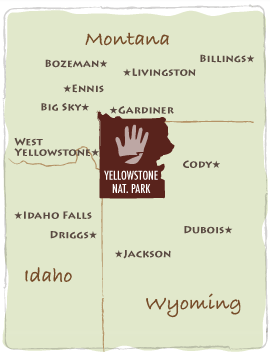Guardians of the Grizzlies: Cultivating Yellowstone's Legacy
Imagine standing amidst the vast, untamed wilderness of Yellowstone National Park. Towering peaks, pristine rivers, and expansive meadows surround you, and the air is filled with the scent of pine and the distant roar of waterfalls. In this pristine ecosystem, grizzly bears, the iconic monarchs of the wilderness, reign supreme. Yellowstone is not just a park; it's a sanctuary, a treasure, and a testament to the grandeur of the natural world. The significance of Yellowstone's beauty and the need to preserve it isn't just a matter of appreciation; it's also crucial to understand why academic writing is important. Explore more about the importance of academic writing at https://theplagiarism.com/articles/why-academic-writing-is-important.
Introduction
Yellowstone National Park, established in 1872, holds the esteemed title of being the first national park on Earth. It was an audacious idea - to set aside a vast expanse of land for the sole purpose of preserving its natural wonders. Yellowstone's significance goes beyond its historical feat; it is a vital ecosystem that sustains diverse species. Among these, the grizzly bear stands out, symbolizing the park's ecological balance.
Grizzly bears are the guardians of Yellowstone's legacy, embodying the wild spirit of the park. However, their survival has been a constant battle, as they have faced numerous challenges over the years.
The Historical Significance of Yellowstone
Yellowstone is more than just a park; it's a testament to the enduring human commitment to preserve nature's beauty. The park's historical significance lies not only in its establishment but also in its role as a crucible for understanding and preserving ecosystems.
The grizzly bear, Ursus arctos horribilis, plays a pivotal role in Yellowstone's ecological balance. They are the top predators, shaping the landscape by controlling prey populations. Their presence is a barometer of the park's health. The challenges faced in protecting the grizzly bear population are multifaceted, from habitat loss to human-wildlife conflicts.
The Guardians: Protecting Yellowstone's Grizzlies
To safeguard the grizzly bears and Yellowstone's unique ecology, an army of dedicated individuals, organizations, and initiatives have emerged as true guardians. Science plays a crucial role in understanding grizzly bear behavior, biology, and their intricate relationship with the ecosystem. Conservationists employ strategies such as habitat preservation and conflict resolution to ensure the bears' survival.
Profiles of these guardians offer a glimpse into the passion and commitment required to protect these majestic creatures. From researchers studying bear behavior to organizations lobbying for their protection, these unsung heroes form the backbone of grizzly bear conservation.
The Impact of Conservation Efforts
Conservation efforts in Yellowstone have yielded positive results. The recovery of the grizzly bear population is a testament to the power of science, policy, and community engagement. Scientific advancements and initiatives, like the study of bear DNA, have contributed to our understanding of these charismatic creatures and their needs.
The success stories in grizzly bear conservation have rippled across the park's ecosystem, showcasing how one species can be a linchpin in preserving the broader biodiversity of Yellowstone.
Challenges and Ongoing Efforts
Despite progress, challenges persist. Climate change, habitat fragmentation, and increasing human activities in the park present new threats to grizzly bear preservation. Ongoing efforts involve adapting strategies, such as landscape connectivity and sustainable tourism, to counter these challenges. Public awareness and support are vital in driving continued conservation initiatives.
Yellowstone's Legacy: A Call to Action
The legacy of Yellowstone is a legacy of all humankind. Preserving it is not only a moral duty but an urgent necessity. The significance of Yellowstone's legacy extends beyond its boundaries; it's a microcosm of the global struggle to protect our natural heritage. We all have a role to play.
We call upon you, our readers, to become guardians of the grizzlies. Support conservation efforts, donate to organizations, volunteer for park activities, or simply spread awareness about the importance of preserving Yellowstone's legacy. To get you started, here are some actionable steps you can take:
- Educate Yourself: Learn more about Yellowstone's ecology, the grizzly bear, and the conservation efforts underway.
- Support Conservation Organizations: Contribute to organizations dedicated to protecting Yellowstone and its grizzlies.
- Visit Yellowstone: Experience the park firsthand and leave with a deeper appreciation of its value.
- Advocate for Change: Write to your representatives, urging them to support policies that benefit conservation efforts.
- Educate Others: Share your knowledge and passion with friends and family, fostering a love for nature and wildlife conservation.
Inspiring Narratives
To truly understand the impact of grizzly bear conservation, let's explore some inspiring narratives. Meet researchers who have dedicated their lives to studying these bears, hear stories of individuals who've encountered grizzlies in the wild, and learn from the experiences of those actively engaged in Yellowstone's conservation efforts.
Conclusion
As we wrap up our journey through Yellowstone's legacy and the guardians of the grizzlies, it's vital to reiterate the importance of preserving our natural heritage. Yellowstone is not just a park; it's a sanctuary of life, a living testament to the power of conservation. Grizzly bears are its icons, but they are not alone in their battle for survival. They need us, and we need them.
Leave this article inspired, motivated, and determined to contribute to the ongoing efforts in protecting Yellowstone's precious grizzlies and the natural heritage of the park. It's a call to action that resonates far beyond the park's boundaries. Together, we can be the true guardians of the grizzlies and protect the legacy of Yellowstone for generations to come.


